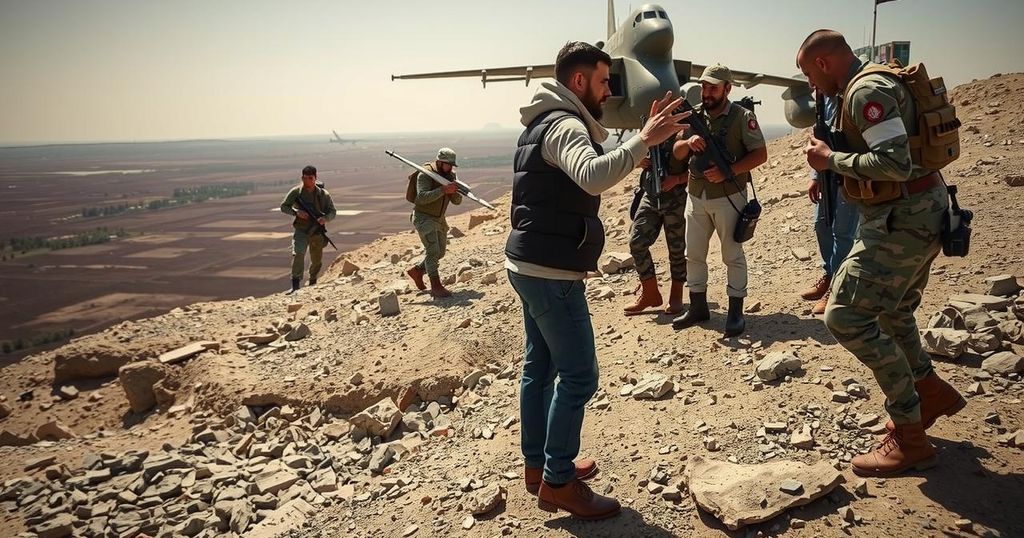Kurds in Syria Seek Substantial Support from Israel Amid Rising Threats
Kurds in Syria express anxiety over Turkish aggression and seek tangible support from Israel amid ongoing threats. After historical attacks, particularly the significant displacements in Afrin, the Kurdish population, primarily organized under the Syrian Democratic Forces (SDF), faces daily risks from Turkish airstrikes and militia violence. The SDF’s battle against ISIS has garnered international attention, leading to hopes that Israel’s promises of support might transform into actionable military assistance to protect Kurdish rights and security.
On December 18, Israeli Foreign Minister Gideon Sa’ar expressed to Jens Plotner, an advisor to Germany’s Chancellor, the importance of international community efforts to protect Syrian minorities, including Kurds. Many Kurds in Syria are concerned whether Israel will take concrete actions rather than merely issue statements regarding the threats they currently face. In light of Turkey’s history of aggression, particularly the 2018 offensive in Afrin which resulted in significant displacement of Kurds, the fear of renewed assaults looms large in areas like Kobani.
In eastern Syria, the Kurdish population, controlled predominantly by the Syrian Democratic Forces (SDF) and backed by the United States, remains vigilant against Turkish threats. The SDF, formed in 2015 to combat ISIS, comprises a diverse group but is primarily composed of Kurdish fighters. Despite having successfully defeated ISIS, Turkey views the SDF as a terrorist threat due to its perceived links to the Kurdistan Workers Party (PKK). Consequently, Turkey supports extremist militias, such as the Syrian National Army (SNA), known for their violent tactics, further complicating the safety of Kurdish civilians.
With the SDF’s presence along the Turkish border and control over significant territories in eastern Syria, Kurdish leaders are acutely aware of the daily risks posed by Turkish drone strikes and SNA artillery. Recent withdrawals of the SDF from certain areas, such as Manbij, have raised concerns among local populations regarding potential harassment and violence from the SNA. Thus, Kurds are seeking reassurance and concrete support from Israel amid these escalating tensions.
The anxiety among Kurds in Syria over their safety is palpable, with many questioning if Israel’s positive rhetoric will translate into tangible military support. The reference to Israel’s aerial backup of the SDF underscores their hope for practical assistance to combat growing threats from Turkey and its backed groups, reminiscent of the support provided to Hamas before the October 7 escalation.
As the situation in Syria evolves, with the SDF now navigating potential alliances with the emergent Syrian government, Kurds are left pondering their fate. Reports claim that the new leadership in Damascus endorses Kurdish inclusivity, presenting an unexpected avenue for dialogue. However, Kurdish communities remain wary of Turkey’s ambitions to extend its occupation of northern Syria further.
In this context, the prospect of cooperation between Israel and the SDF or the US-led Coalition is tantalizing yet unproven. Kurds fear the repercussions of inaction as they face relentless bombardments from both Turkish forces and the SNA. Their pleas for help emphasize the urgent need for a ceasefire that must be observed and respected, contrasting sharply with the ongoing one-sided attacks from Turkish-backed factions.
Overall, the stability of Kurdish-majority regions in Syria hangs precariously in the balance, relying heavily on the international community’s responsiveness and commitment to safeguarding minority rights. As tensions rise, Kurdish voices increasingly call for decisive action from global powers, particularly Israel, to counter threats and bolster their security in the tumultuous landscape of eastern Syria.
The Kurdish population in Syria, especially in the regions controlled by the Autonomous Administration of North and East Syria (AANES) and the Syrian Democratic Forces (SDF), faces existential threats primarily from Turkey and its allied militias. The historical context includes Turkey’s prior military operations in Kurdish areas, notably the 2018 Afrin offensive, which resulted in the forced displacement of over 150,000 Kurds. With their earlier collaboration with US forces against ISIS, the SDF emerged as a formidable military alliance, but their subsequent targeting by Turkey underscores ongoing geopolitical tensions in the region. The Kurds’ reliance on international allies, especially Israel, has become vital for their survival amid the growing aggression from Turkish-backed factions.
In conclusion, the situation for Kurds in Syria is increasingly precarious, highlighted by their apprehensions regarding Turkish aggression and the ambiguous support from international allies like Israel. The SDF’s past successes against ISIS have been overshadowed by continual threats from both Turkey and extremist groups. As the Kurdish population seeks concrete assistance amid escalating hostilities, the hope remains that international actors will respond effectively to the urgent needs of this vulnerable community, thereby ensuring their safety and continued presence in Syria.
Original Source: www.jpost.com




Post Comment